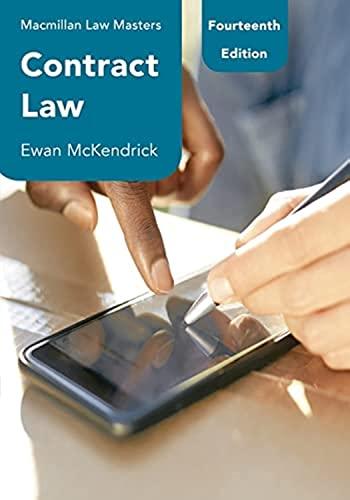Question
1. In Lemon v. Kurtzman, the Supreme Court found that: Answer: the passing of any state laws that establish a religious body is a direct
1. In Lemon v. Kurtzman, the Supreme Court found that:
Answer: the passing of any state laws that establish a religious body is a direct violation of the United States Constitution
2. Brown v. Board of Education of Topeka, 347 U.S. 483 (1954), was a landmark case in which the United States Supreme Court declared:
Answer: state laws establishing separate public schools for black and white students to be unconstitutional.
3. In Janus v. American Federation of State, County, and Municipal Employees, Council 31, No. 16-1466, 585 U.S. (2018), it was decided:
Answer: that union fees collected from non-union members in the public sector violate the First Amendment.
4. San Antonio Independent School District v. Rodriguez, 411 U.S. 1 (1973), was a case in which the Supreme Court of the United States held that the San Antonio Independent School District's financing system, which was based on local property taxes, was an unconstitutional violation of the Fourteenth Amendment's equal protection clause.
Answer: False
5. Pickering v. Board of Education, 391 U.S. 563, held that in the absence of proof of the teacher knowingly or recklessly making false statements the teacher had a right to speak on issues of public importance without being dismissed from his or her position.
Answer: True
6. In School Dist. of Abington Tp. v. Schempp, 374 U.S. 203 (1963), the Supreme Court ruled 8-1 to uphold the district court's ruling that any form of religious action made by a public school is a violation of the 1st Amendment by nature of the Establishment Clause.
Answer: False
7. In Wisconsin v. Jonas Yoder, 406 U.S. 205 (1972), the U.S. Supreme Court ruled (7-0) that Wisconsin's compulsory school attendance law was unconstitutional when applied to the Amish because it violated their rights under the First Amendment, which guaranteed the free exercise of religion.
Answer: True
8. Tinker v. Des Moines Independent Community School District, 393 U.S. 503 (1969), was a landmark decision by the United States Supreme Court that defined the constitutional rights of students in U.S. public schools. The Tinker Test is still used by courts today to determine whether a school's disciplinary actions violate students' First Amendment rights. In the case, school administrators suspended students for praying at the flag pole prior to the school day. The court ruled that students had the right to establish prayer on a school campus as long as school officials did not lead the prayer.
Answer: False
9. The New Jersey v. T.L.O., 469 U.S. 325 (1985), decision strikes the balance between schoolchildren's legitimate expectations of privacy and the school's equally legitimate need to maintain an environment in which learning can take place. Consequently, school officials need not obtain a warrant before searching a student who is under their authority. However, school officials must have probable cause to believe that the subject of the search has violated or is violating the law.
Answer: True
10. In the case of Bethel School District v. Fraser, 106 S.Ct. 3159 (1986), the Supreme Court ruled:
Answer: Under the First Amendment, the use of an offensive form of expression may not be prohibited to adults making what the speaker considers a political point, but it does not follow that the same latitude must be permitted to children in a public school.
Explanation:
Answer well explained above.
Step by Step Solution
There are 3 Steps involved in it
Step: 1

Get Instant Access to Expert-Tailored Solutions
See step-by-step solutions with expert insights and AI powered tools for academic success
Step: 2

Step: 3

Ace Your Homework with AI
Get the answers you need in no time with our AI-driven, step-by-step assistance
Get Started


